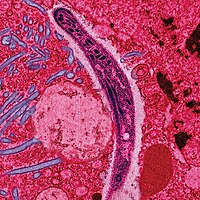
Photo from wikipedia
Sexually transmitted infections (STIs) caused by Neisseria gonorrhoeae, Chlamydia trachomatis and Mycoplasma genitalium are a common cause of pelvic inflammatory disease (PID) which can lead to tubal factor infertility (TFI).… Click to show full abstract
Sexually transmitted infections (STIs) caused by Neisseria gonorrhoeae, Chlamydia trachomatis and Mycoplasma genitalium are a common cause of pelvic inflammatory disease (PID) which can lead to tubal factor infertility (TFI). TFI is one of the most common causes of infertility, accounting for 30% of female fertility problems. STIs can also have an impact on pregnancy, leading to adverse pregnancy outcomes. Escalating antibiotic resistance in Neisseria gonorrhoeae and Mycoplasma genitalium represents a significant problem and can be therapeutically challenging. We present a comprehensive review of the current treatment options, as well as the molecular approach to this subject. We have given special attention to molecular epidemiology, molecular diagnostics, current and new treatments, and drug resistance.
Journal Title: International Journal of Molecular Sciences
Year Published: 2021
Link to full text (if available)
Share on Social Media: Sign Up to like & get
recommendations!